Netherlands - Political Parties
The Netherlands’ system of proportional representation and its low electoral threshold for entering parliament makes the Tweede Kamer (House of Representatives) home to many parties of different political stripes. By the end of 2016 there were 17 different parties and splinter groups in the 150-seat lower house of parliament, following the decision by Labour MP Jacques Monasch to quit the party because of differences over the leadership election. In the March 2012 general election, 12 different parties won seats, but eight MPs later left the party they were elected to serve. By law, they were entitled to remain in parliament and home affairs minister Ronald Plasterk rejected calls to change the constitution to force them to stand down.
Since the early 1990s, the Dutch electorate has been adrift in a way that renders the concept of »floating voter« an understatement. Every election has brought about a large shift in the vote, and since 2002 it has been the political fringes in particular that have profited from footloose voters looking for a home. In 2002, it was Pim Fortuyn’s party that obtained 26 seats after its leader was murdered. In 2006, it was the Socialist Party (similar to Die Linke in Germany) that managed 24 seats. In 2010, it was the PVV of Geert Wilders that grew from 9 to 24 seats. In sum, 68 seats changed parties, almost half of the total number – 150 – in the Second Chamber. The volatility of the electorate shows that party identifica- tion has become quite weak. Very few voters stick to their party, come what may. Most voters decide only when the election comes around which party will have their preference, often a few days before election day or only at the ballot box.
A basic trend since the 1990s, like the growing volatility, is the decline of the three traditional »Volksparteien«: the Christian Democrats (CDA), the Social Democrats (PvdA) and the conservative liberals (VVD). They have lost both members and votes and, most importantly, they are losing their grip on the formation of coalition governments. There is now no single dominant party in the Dutch political landscape. The best two performers carry 20 per cent of the vote, the two next best between 14 and 16 per cent and the three runners up between 7 and 10 per cent – a nightmare for anyone tasked with the formation of a new government.
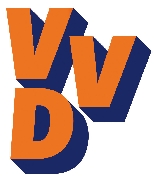 The Liberal (VVD) Party is "liberal" in the European, rather than American, sense of the word. It thus attaches great importance to private enterprise and the freedom of the individual in political, social, and economic affairs. The VVD is generally seen as the most conservative of the major parties. As of February 2007 it had 22 seats in the Second Chamber.
The Liberal (VVD) Party is "liberal" in the European, rather than American, sense of the word. It thus attaches great importance to private enterprise and the freedom of the individual in political, social, and economic affairs. The VVD is generally seen as the most conservative of the major parties. As of February 2007 it had 22 seats in the Second Chamber.
Under the European definition of liberal, the party is a right-wing entity within the Dutch political spectrum. It is a strong advocate of smaller government and a defender of individual freedoms. It tends to be relatively progressive on the social front, believing in a firm separation of church and state for instance, but it is also a party of law and order, and has supported tough immigration legislation. The VVD used to pretty much cover the rightmost spectrum of the Dutch political landscape on its own until some of its more radical elements split from the party. Two parliamentarians who defected, Rita Verdonk in 2007 and Geert Wilders in 2004, have started their own parties and are drawing voters away from the VVD.
 The Christian Democratic Appeal (CDA) was formed from the merger of the Catholic People's Party and two Protestant parties, the Anti-Revolutionary Party and the Christian-Historical Union. The merger process, begun in the early 1970s to try to stem the tide of losses suffered by religiously based parties, was completed in 1980. The CDA has since been the dominant force in Dutch politics. The CDA supports free enterprise and holds to the principle that government activity should supplement but not supplant communal action by citizens. On the political spectrum, the CDA sees its philosophy as standing between the "individualism" of the Liberals and the "statism" of the Labor Party. As of February 2007 CDA had 41 seats in the current Second Chamber, more than any other party.
The Christian Democratic Appeal (CDA) was formed from the merger of the Catholic People's Party and two Protestant parties, the Anti-Revolutionary Party and the Christian-Historical Union. The merger process, begun in the early 1970s to try to stem the tide of losses suffered by religiously based parties, was completed in 1980. The CDA has since been the dominant force in Dutch politics. The CDA supports free enterprise and holds to the principle that government activity should supplement but not supplant communal action by citizens. On the political spectrum, the CDA sees its philosophy as standing between the "individualism" of the Liberals and the "statism" of the Labor Party. As of February 2007 CDA had 41 seats in the current Second Chamber, more than any other party.
Since the party's founding, all but one of the Netherlands’ prime ministers have hailed from this party’s ranks. Jan Peter Balkenende has held the highest office since 2002. CDA is a Christian party and draws on the Bible “for inspiration and foundation”, but it includes members from other religions and has fielded a number of openly homosexual politicians. The CDA occupies the centre-right on most economic issues and tends to be conservative on social matters.
The Christian Democrats find themselves in rough waters not only because they have to operate in a deeply secularised environment – the Netherlands having lost its faiths at high speed – but also because they have lost one of their main political functions: mediating between different social groups, such as farmers, employers, employees, housewives and small entrepreneurs.
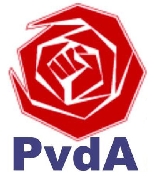 The Labor Party (PvdA), a classic European Social Democratic party, is left of center. As of February 2007 it had 33 seats in the Second Chamber. Labor's program is based on greater social, political, and economic equality for all citizens, although in recent years the party has begun to debate the role of central government in that process. Although called the Labor Party, it has no formal links to the trade unions.
The Labor Party (PvdA), a classic European Social Democratic party, is left of center. As of February 2007 it had 33 seats in the Second Chamber. Labor's program is based on greater social, political, and economic equality for all citizens, although in recent years the party has begun to debate the role of central government in that process. Although called the Labor Party, it has no formal links to the trade unions.
Founded in 1948, the PvdA is the traditional social democratic force in Dutch politics. Like Labour parties elsewhere, it is generally considered an ally of the trade unions and supports redistribution of wealth. Labour led two recent government coalitions, between 1994 and 2002, which were defined by a progressive take on social issues and 'third-way' style economic governance with some liberal tenets. In February 2010, PvdA ministers walked out of Balkenende’s fourth coalition cabinet over the possible extension of the Dutch armed forces’ deployment in Afghanistan.
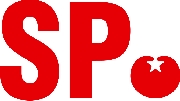 The Socialist Party (SP) was founded as a grass root Marxist-Leninist movement in 1972. This working-class leftist alternative to the Labor Party succeeded at being elected to parliament in 1994. At every subsequent election the party grew, and in November 2006 it obtained 25 seats, which made it the third-largest party. The party is fundamentally nationalistic and opposes globalization, the European Union and Dutch participation in international peacekeeping. It also favors cutting defense spending by 40%.
The Socialist Party (SP) was founded as a grass root Marxist-Leninist movement in 1972. This working-class leftist alternative to the Labor Party succeeded at being elected to parliament in 1994. At every subsequent election the party grew, and in November 2006 it obtained 25 seats, which made it the third-largest party. The party is fundamentally nationalistic and opposes globalization, the European Union and Dutch participation in international peacekeeping. It also favors cutting defense spending by 40%.
Born out of a Maoist splinter group in the 1970s, this party – referred to by its detractors as populist left – tends to the left of Labour on social-economic issues. The party is a staunch defender of state benefits such as pensions and disability pay, but also supports a more proactive leftist agenda, including the re-nationalisation of privatised utility companies. The party’s roots lies in the southern Dutch town of Oss, from where it has steadily expanded across the country. On the national level, it led a marginal existence until the election of 2006, when it burst into the mainstream by garnering a sixth of the vote. After its poor performance in the March 2010 local elections, however, and the resignation of party leader Agnes Kant, it had not been doing well in the polls.
 Populist Party for Freedom (PVV) Scorned by some, worshipped by others, led by Geert Wilders, even the terminology used to describe the PVV is wrought with controversy. Its detractors refer to the party as ‘extreme right’, based on its xenophobe ideas and anti-establishment attitude, but, unsurprisingly, the PVV doesn't like the label one bit. The party opposes Islam, and what it calls ‘Moroccan street terrorists’ and has proposed radical solutions to both problems in the past; imposing a tax on headscarves and shooting them in the knees respectively. It is, however, rather leftist in its social policies and has made keeping the pension age at 65 paramount. In a way, the PVV is heir to the LPF party of Pim Fortuyn, the Dutch politician assassinated by a rogue environmental activist in 2002. Since Fortuyn’s rise, part of the Dutch electorate fed up with the current ruling class and the results of mass immigration had been adrift. Part of the former LPF electorate seemed to have found a new political home with the PVV.
Populist Party for Freedom (PVV) Scorned by some, worshipped by others, led by Geert Wilders, even the terminology used to describe the PVV is wrought with controversy. Its detractors refer to the party as ‘extreme right’, based on its xenophobe ideas and anti-establishment attitude, but, unsurprisingly, the PVV doesn't like the label one bit. The party opposes Islam, and what it calls ‘Moroccan street terrorists’ and has proposed radical solutions to both problems in the past; imposing a tax on headscarves and shooting them in the knees respectively. It is, however, rather leftist in its social policies and has made keeping the pension age at 65 paramount. In a way, the PVV is heir to the LPF party of Pim Fortuyn, the Dutch politician assassinated by a rogue environmental activist in 2002. Since Fortuyn’s rise, part of the Dutch electorate fed up with the current ruling class and the results of mass immigration had been adrift. Part of the former LPF electorate seemed to have found a new political home with the PVV.
The Party for Freedom has long been defined by its strict party discipline. For nearly four years, not a single representative strayed from the party line in public. Geert Wilders' control of the PVV was uncontested. But in 2010 one of the PVV's members of parliament came forward to challenge Geert Wilders' absolute leadership. Hero Brinkman argued the PVV needed to adopt more democratic practices.
 Green party GroenLinks was formed in 1990 out of a hodgepodge of leftist political parties including pacifists, communists and evangelicals. In recent years, the party has come to describe itself as ‘liberal left’. It is on the progressive end of the spectrum on social issues, including euthanasia and the further decriminalisation of drug use and has a more positive attitude towards immigration than many other parties do. On most economic issues, the party tends to come out on Labour’s left. As the name implies, the party also focuses on environmental sustainability and animal rights.
Green party GroenLinks was formed in 1990 out of a hodgepodge of leftist political parties including pacifists, communists and evangelicals. In recent years, the party has come to describe itself as ‘liberal left’. It is on the progressive end of the spectrum on social issues, including euthanasia and the further decriminalisation of drug use and has a more positive attitude towards immigration than many other parties do. On most economic issues, the party tends to come out on Labour’s left. As the name implies, the party also focuses on environmental sustainability and animal rights.
 Orthodox Christian party ChristenUnie was formed out of a merger of devoutly Protestant parties in 2001. The ChristenUnie represents the Christian voters who are pro-life, pro-God and often uncomfortable with homosexuality. It tends to the left on certain economic issues, being a strong supporter of foreign aid to developing nations, for instance. Though it has only a small following nationally, the ChristenUnie is a dominant political force in the Dutch ‘bible belt’, a string of small towns with large orthodox Protestant populations. After obtaining six seats in the 2006 election, it helped the Christian democrats and Labour form the coalition that fell apart in February 2010.
Orthodox Christian party ChristenUnie was formed out of a merger of devoutly Protestant parties in 2001. The ChristenUnie represents the Christian voters who are pro-life, pro-God and often uncomfortable with homosexuality. It tends to the left on certain economic issues, being a strong supporter of foreign aid to developing nations, for instance. Though it has only a small following nationally, the ChristenUnie is a dominant political force in the Dutch ‘bible belt’, a string of small towns with large orthodox Protestant populations. After obtaining six seats in the 2006 election, it helped the Christian democrats and Labour form the coalition that fell apart in February 2010.
 Left-wing liberals D66 Founded by a group of intellectuals in 1966, this party has since known extreme ups and downs. D66’s former slogan was ‘the reasonable alternative’, and it often fares well in elections as a second choice for some parts of the electorate that are, for whatever reason, disenchanted with establishment parties. Because it has such an unstable electoral base, it has varied in size from 24 to its current 3 seats, a record low. Under Pechtold, D66 looks set to regain a lot of lost ground in the upcoming elections. D66 is defined by its progressive, liberal social agenda. It considers governmental reform one of its top priorities, arguing for a directly elected prime minister, for instance. On economic issues it leans to the left only slightly.
Left-wing liberals D66 Founded by a group of intellectuals in 1966, this party has since known extreme ups and downs. D66’s former slogan was ‘the reasonable alternative’, and it often fares well in elections as a second choice for some parts of the electorate that are, for whatever reason, disenchanted with establishment parties. Because it has such an unstable electoral base, it has varied in size from 24 to its current 3 seats, a record low. Under Pechtold, D66 looks set to regain a lot of lost ground in the upcoming elections. D66 is defined by its progressive, liberal social agenda. It considers governmental reform one of its top priorities, arguing for a directly elected prime minister, for instance. On economic issues it leans to the left only slightly.
 Fundamentalist Christian SGP Founded in 1918, the SGP is the oldest party seated in the Dutch parliament. Representing the most fundamentalist of the country's Reformed Christians, the party opted not to join its fellow small Christian parties when they merged into the ChristenUnie in 2001. Unsurprisingly, the party has a very conservative position on a number of issues, its most controversial one regarding women, who are not allowed to hold political office on the party's behalf. The Dutch high court found this policy unconstitutional, but the party had yet to put forward a female candidate.
Fundamentalist Christian SGP Founded in 1918, the SGP is the oldest party seated in the Dutch parliament. Representing the most fundamentalist of the country's Reformed Christians, the party opted not to join its fellow small Christian parties when they merged into the ChristenUnie in 2001. Unsurprisingly, the party has a very conservative position on a number of issues, its most controversial one regarding women, who are not allowed to hold political office on the party's behalf. The Dutch high court found this policy unconstitutional, but the party had yet to put forward a female candidate.
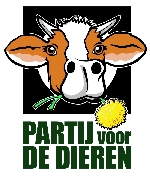 Animal rights party Partij voor de Dieren The Netherlands is the only country in the world where a party solely dedicated to the welfare of animals holds seats in national parliament. The party was established in 2002 and at the 2006 general election, the pro-animal rights party Partij voor de Dieren (PvdD) won 2 of the 150 seats in parliament. The party made its gains because the Dutch system of proportional representation allows parties with only minor support to win seats in parliamen. And it was an international first: a party whose sole objective is to improve the welfare of animals was elected to parliament.
Animal rights party Partij voor de Dieren The Netherlands is the only country in the world where a party solely dedicated to the welfare of animals holds seats in national parliament. The party was established in 2002 and at the 2006 general election, the pro-animal rights party Partij voor de Dieren (PvdD) won 2 of the 150 seats in parliament. The party made its gains because the Dutch system of proportional representation allows parties with only minor support to win seats in parliamen. And it was an international first: a party whose sole objective is to improve the welfare of animals was elected to parliament.
The party's added value is disputed, however, as both fellow members of parliament and lobbyists for animal welfare organisations have doubts about its real clout. In particular, the numerous, hopeless motions the party submits annoy other parliamentarians. The Dutch Animal Rights Party (PvdD) called for a tax on meat similar to the Danish tax on fatty foods. Party leader Marianne Thieme wants meat - and preferably all animal protein - to be subject to the 19 percent rate of VAT. “There is enough support for this. Research has shown that two-thirds of Dutch people regard meat as a luxury product. “
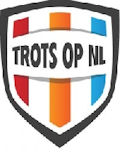 Nationalist party Trots op Nederland Once huge in the polls, by 2010 Rita Verdonk looked to have trouble holding on to her sole seat in parliament. Like Geert Wilders, she is a right-wing VVD defector who seems to draw on a similar slice of the electorate. In 2006 four small parties on the far right -- LPF, Group Wilders, One.nl, and Party for the Netherlands were all vying for voters in various degrees on an anti-immigrant, anti- Islam or pro-integration ticket. They were not expected to make a major dent because voters don't appreciate fragmentation and don't understand why they had not combined forces. Moreover, none of these parties had a truly charismatic leader of the stature of the late Pim Fortuyn. The only true leader that did appeal to voters on the far right is Immigration Minister Rita Verdonk, but in 2006 she was firmly embedded in the VVD party and was bound to draw voters away from the far-right splinter parties to the VVD.
Nationalist party Trots op Nederland Once huge in the polls, by 2010 Rita Verdonk looked to have trouble holding on to her sole seat in parliament. Like Geert Wilders, she is a right-wing VVD defector who seems to draw on a similar slice of the electorate. In 2006 four small parties on the far right -- LPF, Group Wilders, One.nl, and Party for the Netherlands were all vying for voters in various degrees on an anti-immigrant, anti- Islam or pro-integration ticket. They were not expected to make a major dent because voters don't appreciate fragmentation and don't understand why they had not combined forces. Moreover, none of these parties had a truly charismatic leader of the stature of the late Pim Fortuyn. The only true leader that did appeal to voters on the far right is Immigration Minister Rita Verdonk, but in 2006 she was firmly embedded in the VVD party and was bound to draw voters away from the far-right splinter parties to the VVD.
|
NEWSLETTER
|
| Join the GlobalSecurity.org mailing list |
|
|
|

